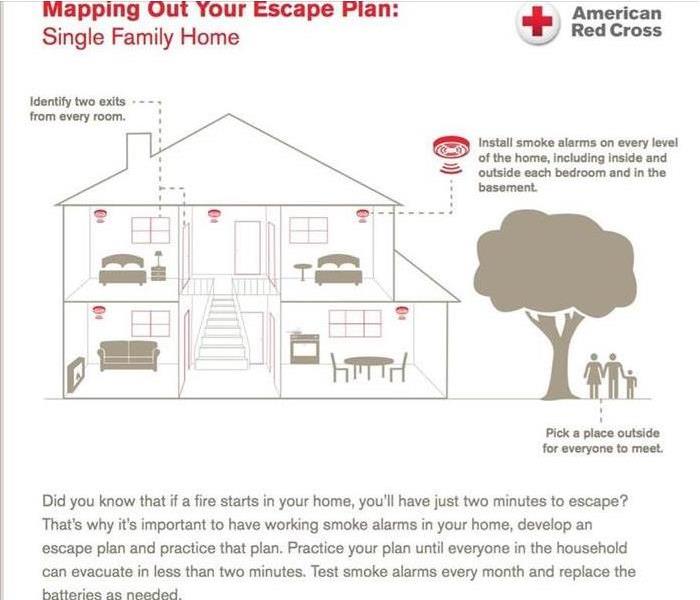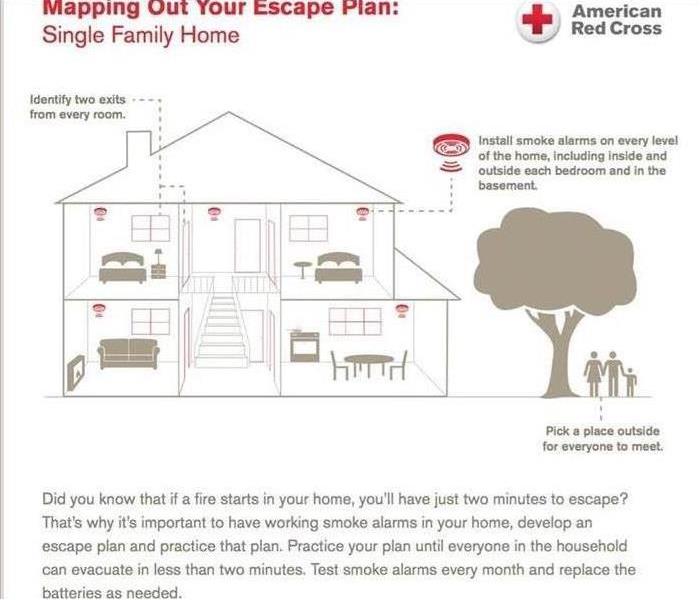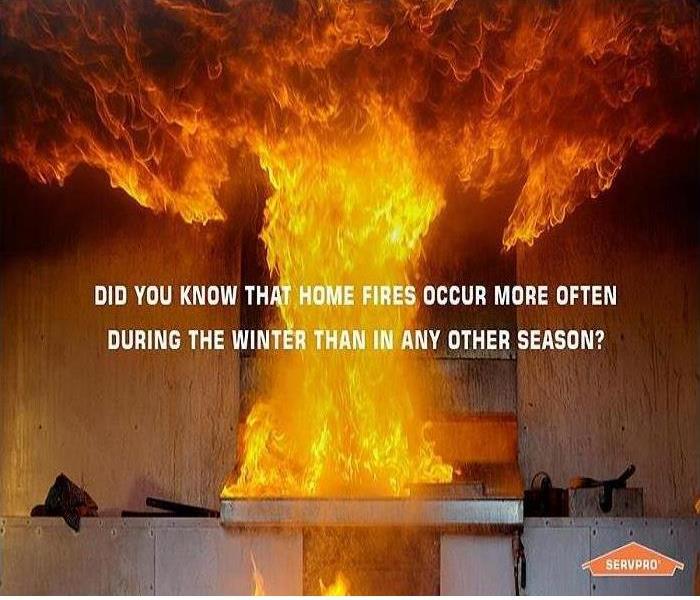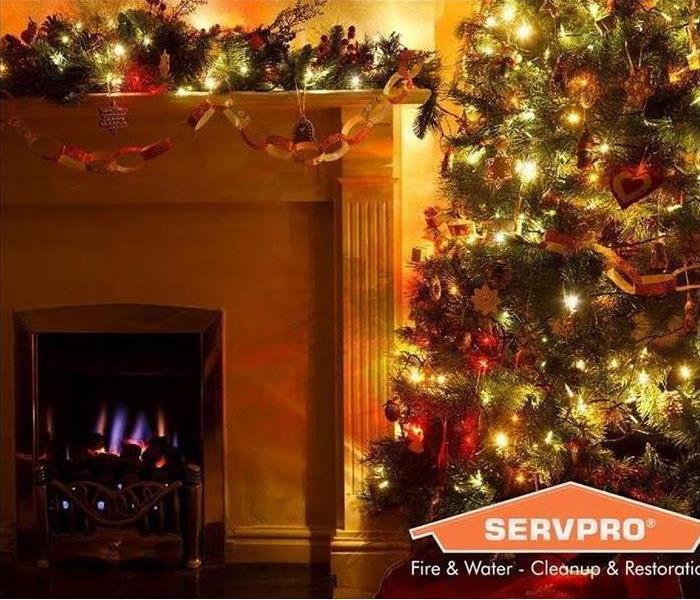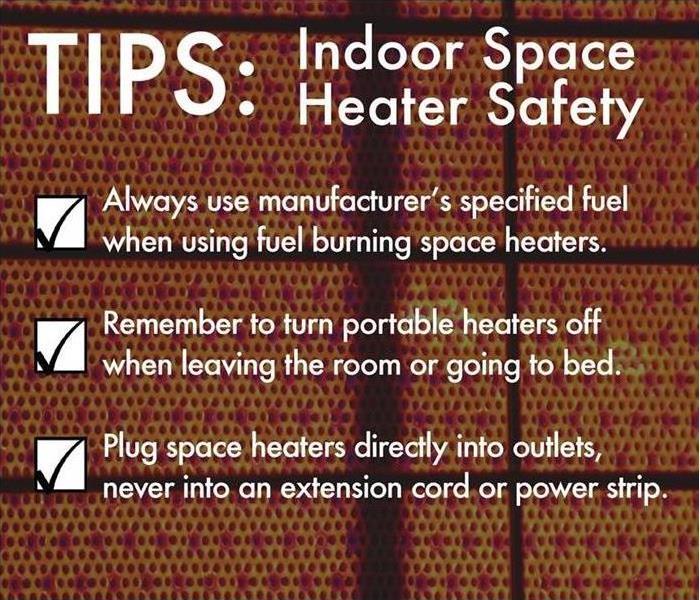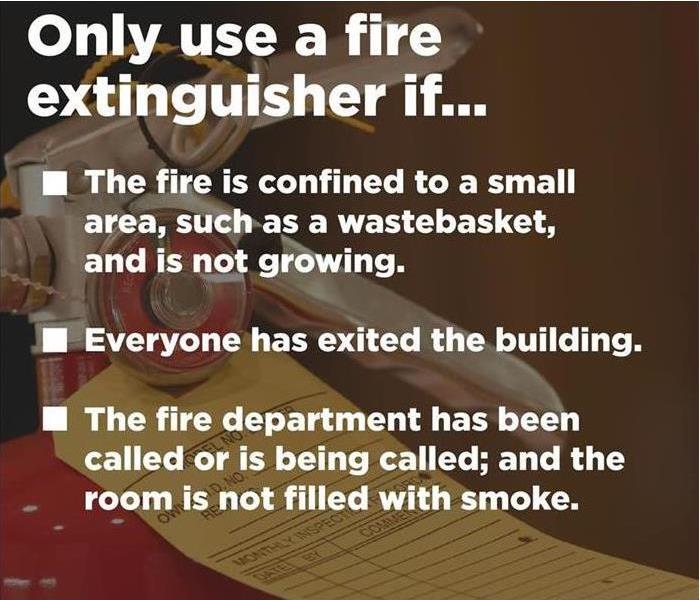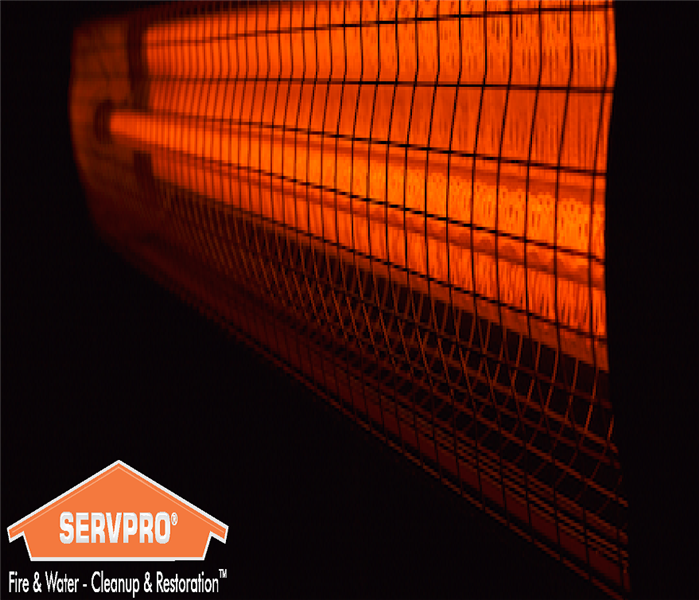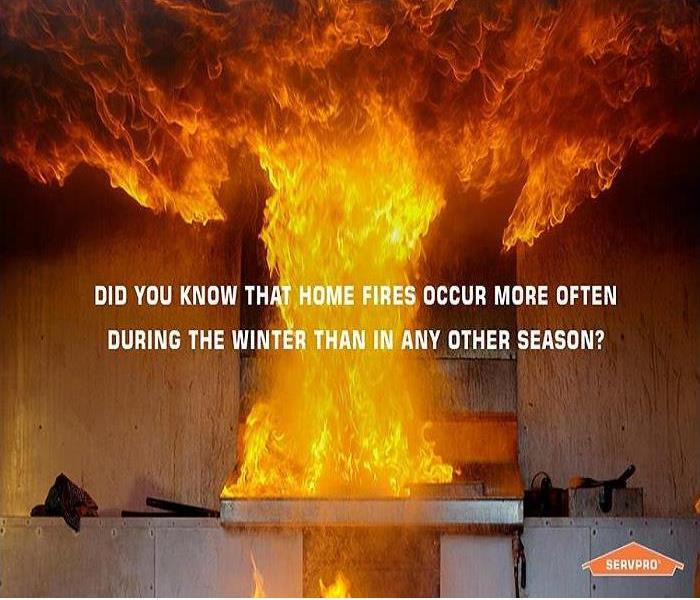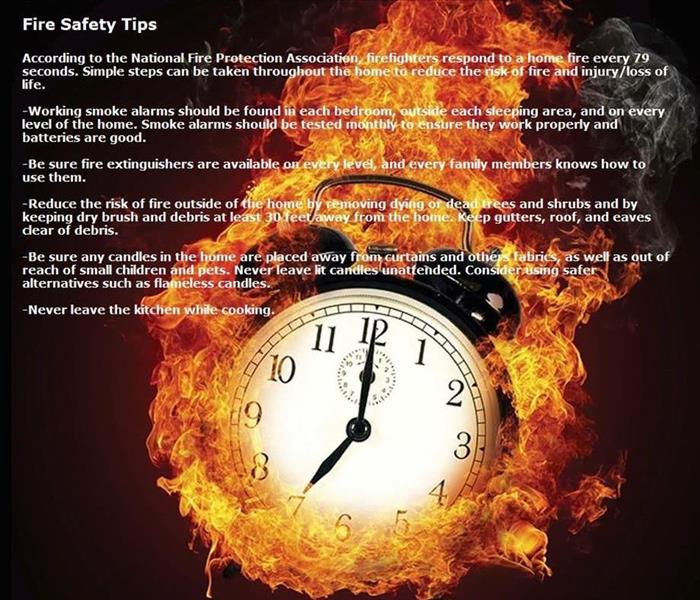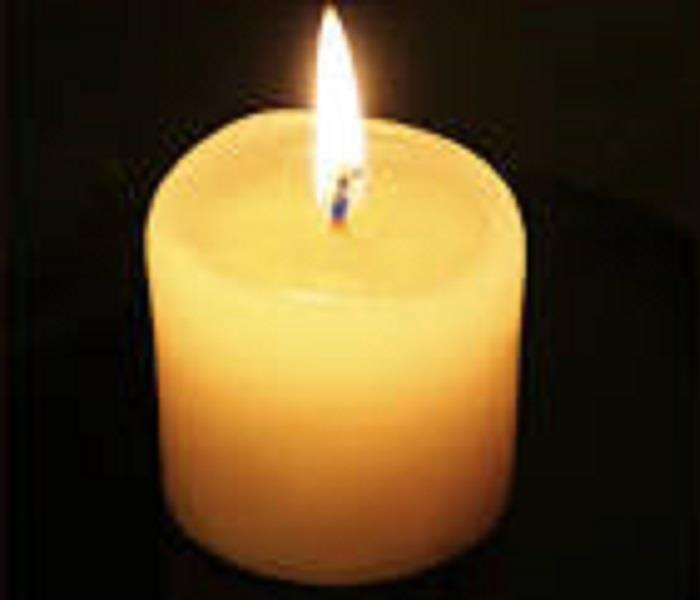Recent Fire Damage Posts
Fire Damage: The Behavior of Smoke ~SERVPRO of Northwest Bergen Has the training and Experience
9/3/2024 (Permalink)
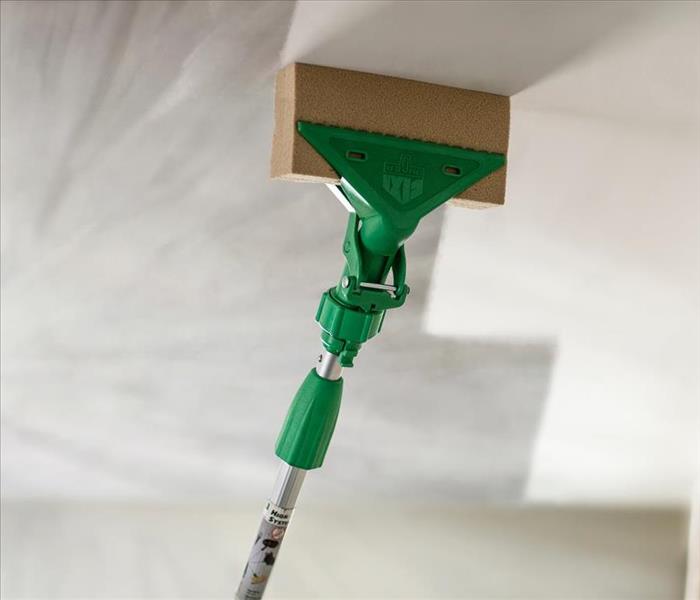 Call SERVPRO of Northwest Bergen to clean up after fire damage, we have years of experience with fire, soot, and smoke damage.
Call SERVPRO of Northwest Bergen to clean up after fire damage, we have years of experience with fire, soot, and smoke damage.
The damage to your Bergen County property following a fire can often be complicated due to the unique behavior of smoke.
There are two different types of smoke--wet and dry. As a result, there are different typed of soot residue after a fire.
SERVPRO of Northwest Bergen County Service Technicians are thoroughly trained in fire cleanup and restoration. They are trained to know about the different types of smoke and its behavior patterns. Knowing this information is vital to proper restoration. Before restoration begins, the technicians will survey the loss to determine the extent of impact from fire, smoke, heat, and moisture on the building materials and contents. The soot will then be tested to determine which type of smoke damage occurred. Pretesting determines the proper cleaning method and allows us to focus on your precious items.
Smoke can penetrate various cavities within the structure, causing hidden damage and odor. Our knowledge of building systems helps us to investigate how far smoke damage may have spread.
The following are additional facts you may not know about smoke.
- Hot smoke migrates to cooler areas and upper levels of a structure.
- Smoke flows around plumbing systems, seeping through the holes used by pipes to go from floor to floor.
- The type of smoke may greatly affect the restoration process.
Types of Smoke:
Wet Smoke (Plastic and Rubber) Low heat, smoldering, pungent odor, sticky, smeary. Smoke webs are more difficult to clean.
Dry Smoke (Paper and Wood) Fast burning, high temperatures, heat rises therefore smoke dries.
Protein Fire Residue (Produced by evaporation of material rather than from a fire) Virtually invisible, discolors paints and varnishes, extreme pungent odor.
Fuel Oil Soot (Furnace Puff Backs) While "puff backs" can create havoc for homeowners, SERVPRO of Northwest Bergen Service Technicians can, in most cases restore the contents and structure quickly.
Other Types (Tear gas, fingerprint powder, and fire extinguisher residue) Special loss situations require special care.
Our technicians are trained to handle even the toughest losses, and are IICRC Certified. The Northwest SERVPRO® team will make any smoke disaster "Like it never even happened."
Call SERVPRO When the Smoke of a Fire Disaster Has Cleared | SERVPRO® of Northwest Bergen County
2/9/2023 (Permalink)
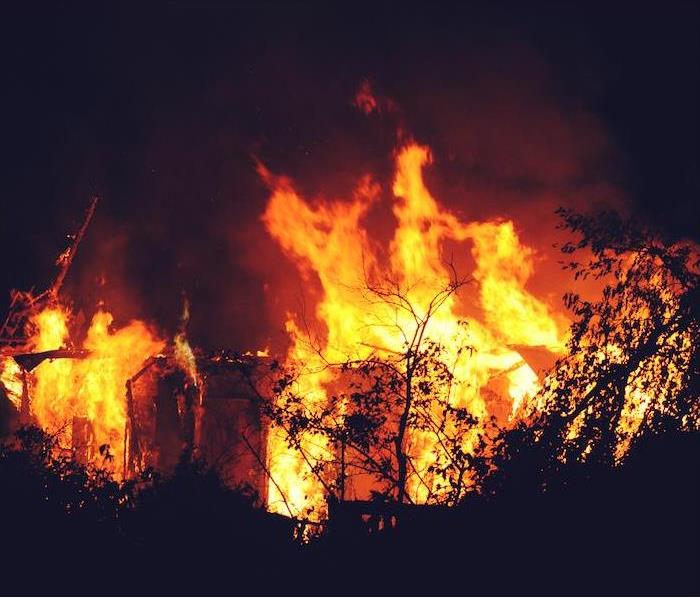 For quick repairs following a fire, get in touch with our team at SERVPRO of Northwest Bergen.
For quick repairs following a fire, get in touch with our team at SERVPRO of Northwest Bergen.
Disasters are one of those things that we all hope never happens, but when they do, they can leave a wide variety of damages behind. While there are lots of ways we can be affected by disasters, a fire is one that will almost always leave a path of destruction.
Cleaning up after a fire emergency can feel daunting and scary, but when you have neighbors like SERVPRO in your community, you can rest assured that you are far from alone. We will walk with you through the entire process and get you back on your feet in no time.
Our Initial MoveWhen you are affected by a fire, your first priority has to be securing the safety of yourself and your family. After that, call our experts to start down the road of recovery.
We can take your call at any time of night or day, and we will start creating a plan immediately by gathering as much information from you over the phone. Our team will be headed your direction in no time with the proper equipment and resources to get things started.
On site, we will first assess the damage as we continue to create a plan that will meet the unique needs of your situation. No two disasters are the same, and we want to ensure that every part of your restoration is covered.
Time to Get to WorkRemoving smoke and soot damage from everything it has penetrated will start once the area is secured. Smoke and soot can reach rooms that never even saw flames, so we will clean walls, floors and ceilings anywhere there is sign of damage. Surfaces will also be sanitized to remove and stop additional odors.
The Most Crucial StepOnce the cleaning process has been completed, our team can get down to the real restoration of your home. This means we will start to put everything back together, including hanging drywall, laying floors or painting a room.
If part of your property could not be salvaged and demolition took place, our team is experienced in construction. We can rebuild an entire room if necessary. It is our goal to put your home back together exactly as you want it. At SERVPRO, we have years of experience, and we are always ready to help.
For rapid repairs following a fire, get in touch with our team at SERVPRO of Northwest Bergen County! We will work as quickly as possible to return you to a safe and fully restored property.
Warm Up and Stay Fire-Safe | SERVPRO® of Northwest Bergen County
1/26/2023 (Permalink)
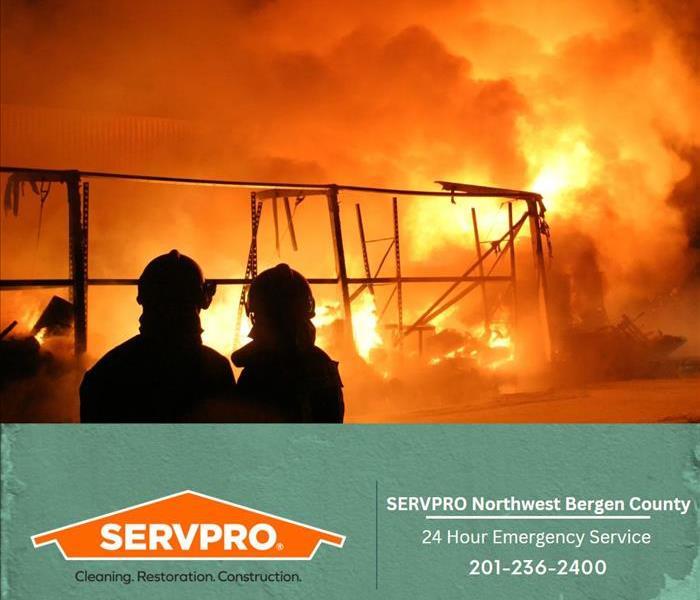 SERVPRO of Northwest Bergen is experienced in fire cleanup and restoration.
SERVPRO of Northwest Bergen is experienced in fire cleanup and restoration.
It might seem like winter has already been here forever, but it didn’t officially start until Dec. 21. While you may have flipped the heating on in your home long ago, without the proper preparations, you could have a fire hazard.
Love them or hate them, the cold months are here and you should be able to stay warm all season. Take steps now to stay fire-safe.
<h3basics">Furnace Basics
Homes in the Bergen County area likely have one of three kinds of heating systems: a boiler, a furnace or baseboard heaters. Boilers run on water or gas and use radiant heat to warm your home, while baseboard heaters warm a single room at a time. Furnace systems are highly efficient and cost-effective systems that can outlast a lot of heating equipment.
No matter what kind of system you have, regular maintenance is the best way to keep them running long-term. Clean your furnace and baseboard heaters for dust, and have your boiler inspected regularly to ensure the heating elements are in working order.
Replace any filters in your systems often. For a furnace system, 90 days is the recommended time frame, although you may want to do it more often if you have pets or someone in the home has allergies. Use the changing season as a good reminder to change your filter.
The air filter not only helps to lengthen the lifespan of your system, but much like a boiler heats without increasing the dust in your home, furnace filters can also eliminate dust and allergens.
<h3safety">Fireplace Safety
Fireplaces make for a cozy centerpiece in your home and can provide additional heating during one of the many snowstorms we experience. Without proper inspections and maintenance, though, a chimney or fireplace can pose quite the fire hazard for your home. Both artificial and wood-burning fireplaces should be inspected and cleaned regularly.
To care for a wood-burning fireplace, clean out ash and soot and ensure that nothing has blocked the chimney. Artificial fireplaces should be dusted regularly, including any removable logs and the cover you use on the front of the fireplace.
<h3heaters">Portable Heaters
Another source of heat commonly used in home is space heaters These portable heaters are great for warming a room quickly, much like the baseboard heaters commonly found in a lot of homes in this county. Running a space heater does require safety measures in order to prevent fires though.
Don’t run your space heater overnight, and always keep it three feet away from any combustible materials. Make sure your space heater is on a flat surface where it won’t get knocked over, and if your heater doesn’t have an automatic shut-off feature when it is tipped, consider upgrading to a new one. Always plug space heaters directly into the wall to avoid electrical surges.
Keep a close eye on the little ones and the furry ones in your home when you are running your heating equipment. Make sure they understand how to stay safe, since it only takes a single accident to cause complete chaos and destruction in your home. Stay cozy this season without the fear of fire.
If you experience fire damage this season, give us a call at SERVPRO of Northwest Bergen County for immediate assistance. We’re here 24⁄7 when you need us!
Spring & Summer Safety Tips for SERVPRO of Northwest Bergen
8/16/2022 (Permalink)
 Your local SERVPRO of Northwest Bergen Service Technicians are on hand 24/7 for emergencies
Your local SERVPRO of Northwest Bergen Service Technicians are on hand 24/7 for emergencies
Restoring fire and smoke damage is one of our specialties. Contact SERVPRO of Northwest Bergen to learn more.Spring and Summer has a way of filling us with life, especially with warmer weather and the social activity that comes with it.
For many, the ultimate social activity is the backyard barbecue. Graduation parties, wedding engagements and family reunions all call for a grilling session or a night around the fire pit.
But these bring with them an inherent rise in fire incidents. In fact, spring sees more daily fires on average than any other time of year.
Since spring is underway and summer around the corner, let’s go over a few fire safety basics for the backyard.
The grill. The grill is a staple of many households in spring and summer, and it’s responsible for much of the activity around festive gatherings. It’s also the prime suspect for accidental fires, because of its unique juxtaposition of flames, high heat, grease and sometimes combustible gas. So be extra careful with those hot dogs. Make sure your grill is working properly and is situated on level ground away from anything flammable. Don’t use accelerants like lighter fluid or gasoline to stoke the fire, and don’t neglect cleaning the grill between uses. Almost 20% of grill fires are due to poor cleaning.
The fire pit. The grill pit has become a favorite backyard item for many homeowners, and it’s a place where conversation and camaraderie seem to come easy. Just make sure that you’re operating yours safely and attended to at all times. Never allow unsupervised kids or pets near the fire. Don’t add leaves or pine needles to the fire; they create embers that can easily be carried away by the wind. And always have a large bucket of water, which you can use to extinguish the fire (slowly, not all at once), or catch any wayward flames or ash.
Chimneys and dryer vents. Clean your chimney while your mind is on fire safety, so you’re not starting the fall with a chimney full of ash and layers of soot. And take the vent pipe off your dryer to remove any lint that might be stuck in it. (Do this again in six months, too.)
Your local SERVPRO of Northwest Bergen Service Technicians are on hand 24⁄7 for emergencies. If you encounter fire damage at your home or business, no matter the cause, we will be there faster and have it cleaned up sooner. Call or click today and experience the SERVPRO difference.
Stay Safer Around the Campfire & Reduce Your Risk | SERVPRO® of Northwest Bergen
7/26/2022 (Permalink)
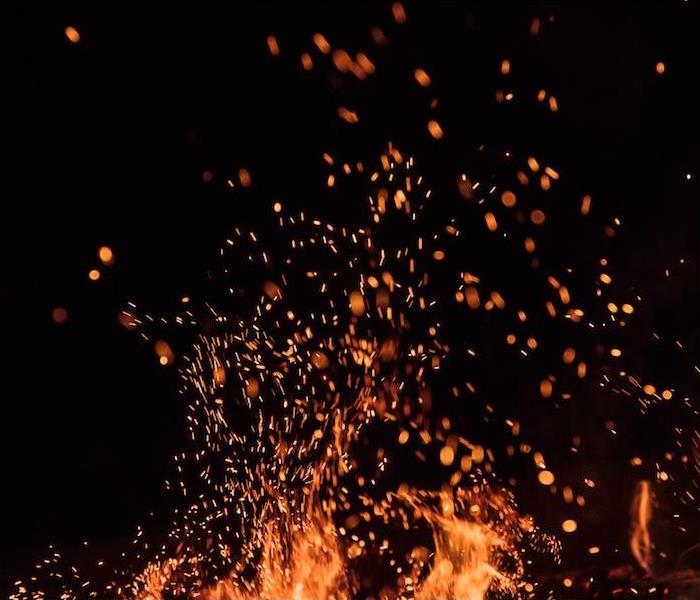 If you have experienced fire or smoke damage, contact SERVPRO of Northwest Bergen.
If you have experienced fire or smoke damage, contact SERVPRO of Northwest Bergen.
Everyone can enjoy the warmth of a fire during a cool summer night. Cooking hotdogs and roasting marshmallows while cherishing each other’s company is a great experience.
Fires are used both in campsites and backyards for a number of reasons, including heat, pest control and the removal of flammable debris. However, our National Park Service has identified that about 85% of wildfires are started by humans, so it’s important to follow safety guidelines, even when you think you have a fire under control.
In New Jersey, we face a medium risk of outdoor fires, but our hazards grow as temperatures rise into the warmer months. Here in Bergen County, we face a relatively low chance of wildfires, but we should still prepare for this disaster.
Preparing for outdoor fires doesn’t mean that we shouldn’t have fires when we want to, but it does mean that we need to be cautious. Following the right safety measures and never leaving fires unattended can keep fires safely contained without putting our region at risk.
Recreational Fire HazardsAll types of fires come with some risk, but fireworks and grills are two of the most common ways outdoor fires begin. Grills alone start approximately 8,800 fires each year, mostly due to user error. It’s crucial to double-check that the propane is off and that the gas lines are secure before leaving your grill after cooking.
If you decide to have a fire, pick a location that is away from your home, vehicles or any excess piles of wood. Additionally, you should only burn wood in the fire and pay attention to the area surrounding the fire so that embers don’t ignite something else.
Many homeowners have decided to implement a backyard fire pit to their property, but it’s important to continue following safety procedures just like any other fire. Portable fire pits should never be placed on top of flammable material, and you need to make sure the flames are not under a porch or overhang.
It might seem like a smart idea to get rid of construction materials or general waste with a fire, but this can cause serious health problems or allow the fire to spread more easily. You should only burn approved firewood to reduce your level of risk.
Other Outdoor Fire HazardsAlthough fires have risks associated with them, they can still be a useful tool for us in more rural areas. When leaf buildup happens fast, using controlled fire to eliminate the debris may seem like the most efficient way.
But in order to reduce the risk of wildfires erupting, our state government issued this ordinance that bans the burning of any kind of refuse, whether it’s plant debris or waste. You can take your excess plant debris to a facility for disposal, or request a fire prevention burn from your local fire department.
Many people also choose to store gasoline in their garage or shed, but these accelerants can create massive problems in short order. Be sure that your containers are approved for gas storage and that no animals or children are able to come into contact with them.
When you want to have an outdoor fire, it’s always best to check local weather alerts first. If the winds are high or there is a dry spell occurring, postpone the fire for next time and avoid unnecessary risks.
Unfortunately, fire damage happens every day. If you suffer from a fire, call SERVPRO of Northwest Bergen. Our restoration experts will get straight to work and restore as much of your home as quickly as possible.
Burn safely outdoors. And save some chocolate for us! If you have experienced fire or smoke damage, contact us today to get restoration started faster.
Follow These Simple Methods to Prevent House Fires | SERVPRO® of Northwest Bergen
6/9/2022 (Permalink)
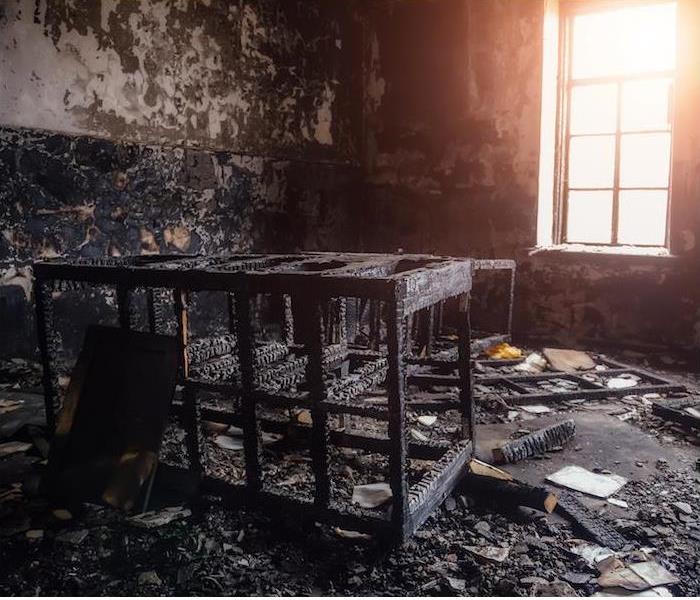 If your home is damaged in a house fire, SERVPRO of Northwest Bergen is here to help. Contact us for any fire restoration need.
If your home is damaged in a house fire, SERVPRO of Northwest Bergen is here to help. Contact us for any fire restoration need.
So far in 2022, over 20,000 house fires have been responded to by the American Red Cross. While this may seem like a lot, it only represents a fraction of the number of fires that have occurred in the United States alone.
The primary way to prevent the damage and loss of life that fires can cause is still smoke detectors. But to aid in their function, here are simple methods you can implement:
Clear the Clutter
Having clothes, loose blankets and similar items strewn around the house can present issues. On top of being messy, these things can become fuel for a potential fire.
If left near a water heater, clothing items can actually be the cause of fires. Having open spaces will create clear escape routes and mitigate the spread of a fire.
In colder places like New Jersey, space heaters are a common catalyst of house fires. It is important to keep clothes and curtains a few feet away from these appliances.
Leaving space between outlets and furniture will allow air to flow properly and prevent overheating that can spark fires inside the home.
Create a Defensible Space in Your Yard
In the event a fire originates outside, strategic landscaping is important. When done properly, this can protect your home and give enough of an area for firemen to prevent fires from reaching your home.
Because they frequently experience wildfires, states like California have created defensible zone requirements. This is because they have proven to slow down the spread and damage of wildfires. Although this risk is not as prevalent in New Jersey, it is still useful to practice these tips.
Despite these tips, you don’t need to stop planting your favorite bulbs. You can use it as an opportunity to place plants and trees to strategically provide protection. On top of this, it is a good idea to remove all dead plants and limbs since they can fuel flames.
Keep It Clean & Keep It Safe
After cleaning the clutter in your home and yard, you can optimize your efforts with a thorough spring-cleaning. Actions like getting your chimney cleaned and inspected are effective ways to reduce risks.
On top of that, the simple act of dusting can prevent fires. Pay attention to the areas that collect a lot of dust and clear those out.
Breaking down all these methods and approaching them systematically makes them more manageable and easy to perform.
If you have experienced fire damage or want to learn more about our fire damage restoration services, contact us today. We’re here to act fast, 24⁄7.
Fire Safety Tip: Summer Grilling Safety Tips
6/2/2022 (Permalink)
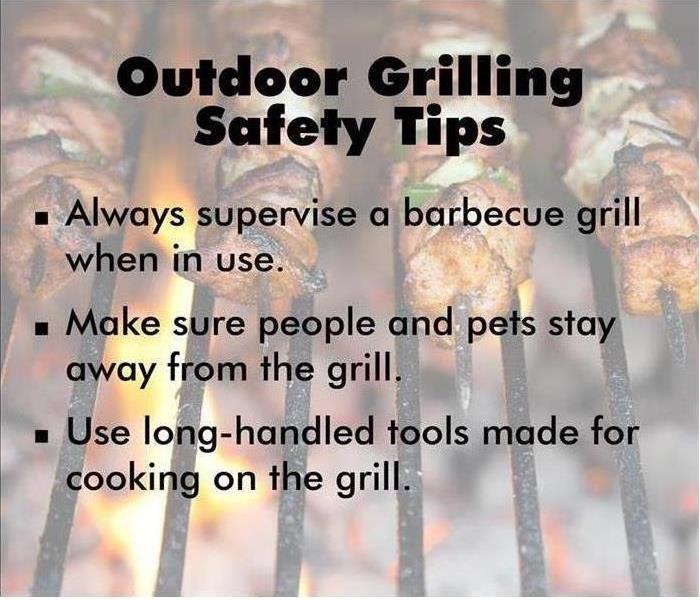 SERVPRO of Northwest Bergen is available 24/7 for emergency service.
SERVPRO of Northwest Bergen is available 24/7 for emergency service.
Keep your family and Bergen County home safe this summer by following a few grilling safety tips.As the season for grilling outside officially kicks off this month here are some tips to remember while grilling at your BBQ.
- Always supervise a barbecue grill when in use
- Make sure people especially young children and pets stay away from the grill
- Use long-handed tools made for cooking on the grill
As a leading fire disaster cleaning and restoration company, SERVPRO of Northwest Bergen understands the process of recovering after a fire disaster destroys your home or business.
There are some tips and steps to take immediately after a fire. We can help guide you through this difficult process dealing with insurance companies and scheduling cleanup and rebuilding.
SERVPRO of Northwest Bergen is ready for any size disaster. We clean and restore Fire, Smoke and Soot damage "Like it never even happened."
Fires Require These 4 Things | SERVPRO® of Northwest Bergen
1/25/2022 (Permalink)
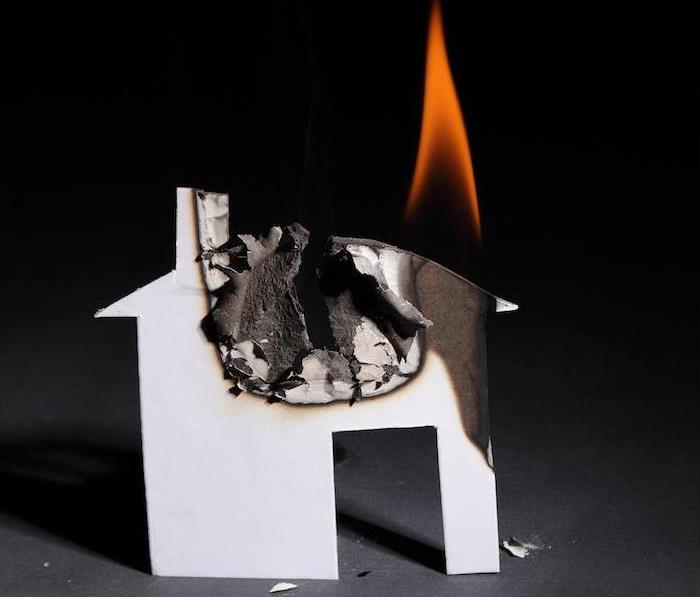 If your home or business has any damage, SERVPRO of Northwest Bergen is ready around the clock to help you recover.
If your home or business has any damage, SERVPRO of Northwest Bergen is ready around the clock to help you recover.
What geometric shape has four equal, triangular sides? If you guessed tetrahedron, congratulations on your junior high math recall!
If you’re afraid you may have accidentally stumbled onto a geometry blog, have no fear: It’s about fire safety!
Scientists use a pictorial representation called the fire tetrahedron (formerly the fire triangle) to help us visualize the things that a fire must have in order to originate. These must-haves for fire also give us insight into ways we can counteract fires—by removing or stopping the things fires need to survive.
The 4 Things a Fire Needs to LiveFuel. This would be what you say the fire burns. Everything from building materials to inorganic plastics are candidates to be fuel, because almost everything burns.
Heat. Every fuel source has a temperature at which it will ignite—for some materials this flash point is lower than others.
Oxygen. If the fuel source is what a fire eats, oxygen is what it breathes. Fires consume oxygen in the area surrounding the flames.
Chemical Chain Reaction. The three elements above have to stay readily available, and the oxygen in particular helps to create a chain reaction that perpetuates the growth of the fire.
The 4 Ways to Stop a FireCool it. If a material has to reach a certain temperature before it will burn, it stands to reason that making that material fall below that threshold will stop it from burning. Cooling the material (typically by using water), restores a thermal balance that causes the fire to stop.
Smother it. Fire extinguishers and foam use this method, which cuts off the supply of oxygen the fire needs in order to thrive.
Starve it. If a fire has nothing to eat, it has no choice but to stop. This method can be used in many applications, but the most common you’d probably recall is the creation of a burn barrier around wildfires, scorching a perimeter around the flames to give them no further ground through which they can spread.
Interrupt the chain reaction. Certain elements and gases can actually stop fires by being introduced into the atmosphere around a fire to disrupt the constant reaction that keeps it going. Halon is the best, most effective example, but its negative effect on the ozone layer has seen its use decline and its availability decrease.
If the fire tetrahedron makes a wreck of your home or business, we’re ready around the clock to help you recover. Contact SERVPRO of Northwest Bergen anytime for fast, thorough cleanup and recovery after a fire.
Disaster Doesn’t Wait for Office Hours | SERVPRO® of Northwest Bergen
12/30/2021 (Permalink)
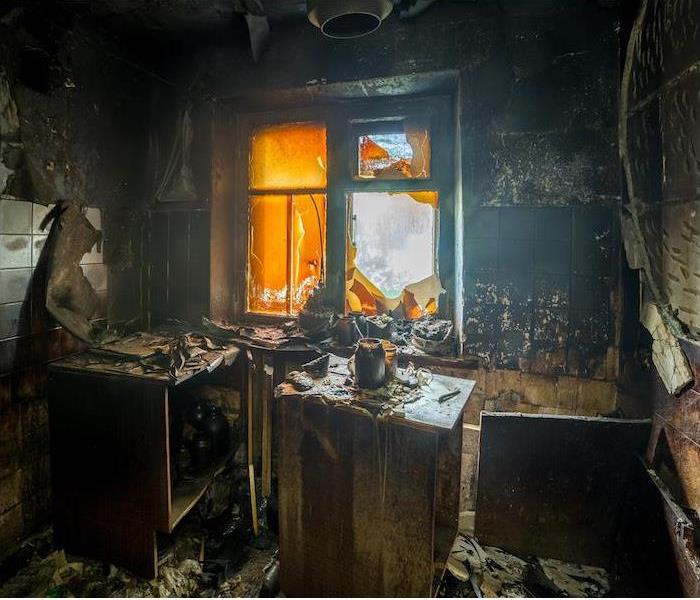 If a fire issue pops up during the holidays, remember the trusted leader in the recovery industry, SERVPRO of Northwest Bergen County.
If a fire issue pops up during the holidays, remember the trusted leader in the recovery industry, SERVPRO of Northwest Bergen County.
Water and fire damage have absolutely no manners. Emergencies show up both uninvited and with no advance notice.
It would be more convenient if all emergencies happened during the workday, or at least during waking hours, but the fact is many don’t. So what do you do when an overnight or weekend issue arises?
You call SERVPRO of Northwest Bergen County, that’s what. SERVPRO of Northwest Bergen County is available 24 hours a day for emergency service, so you never have to wait for service. And that’s certainly a good thing, because every moment you have to wait allows further damage to settle into your home, such as:
After a fire. Once the angry flames have done their thing, their aftereffects sink their claws into your home, in the form of smoke damage and soot. Soot is the black, thick sludge that covers your interior after a fire, the result of unfinished combustion during the fire. It only takes a few minutes for soot to stain every wall, ceiling and yes, oh yes, every fiber of carpet.
The difference between soot and smoke leaving permanent residue and smell behind and not is only a few hours—that’s all the time they need to settle in for good.
After water damage. Water has both quick and long-term damage to do, and part of that long-term damage is setting up the growth of mold. Within the first 48 hours after your water issue, mold starts to grow on organic surfaces where too much moisture is present.
Beyond that, unexpected situations stemming from storms and natural disasters can surprise you at any time, and you need to know you can get help immediately when those moments arrive. Yes, it’s very rude of these occurrences to show up without notice, but at least you know the toughest, fastest team in the industry is only a click or call away. We’re SERVPRO of Northwest Bergen, and we’re Faster to Any Size Disaster.
When you need help after a home or business disaster, fast service is a priority, and there’s nobody faster or more prepared than SERVPRO. Call us anytime to take advantage of our 24-hour emergency service.
The Most Likely Ways a Fire Could Start in Your Home | SERVPRO® of Northwest Bergen
11/11/2021 (Permalink)
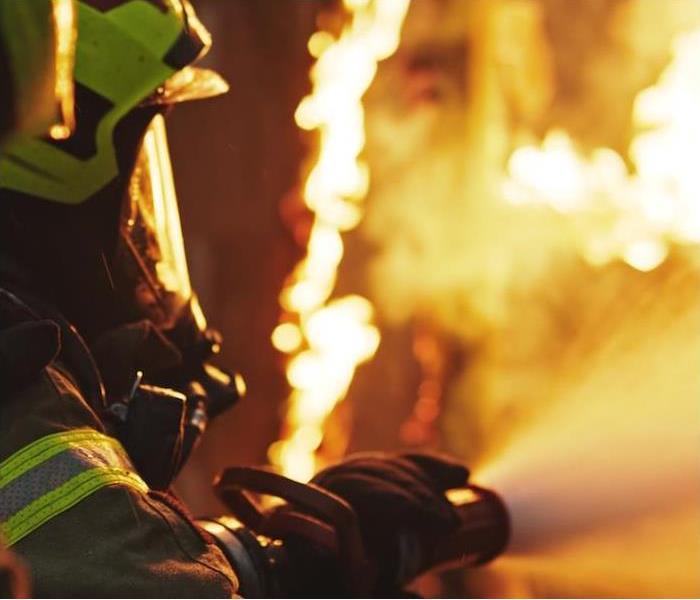 Regardless of the cause, SERVPRO of Northwest Bergen are here for you if your home is affected by fire.
Regardless of the cause, SERVPRO of Northwest Bergen are here for you if your home is affected by fire.
We’ve heard fire safety messages all our lives. We ran fire drills in school, we listened to Smokey the Bear, and we see campaign after campaign on social media and in advertising preaching the virtues of fire safety.
And yet, a quarter of all reported fires in the U.S. start in the house, and a great many of them could be prevented.
Let’s take a deeper look, and see if we can figure out where we can tighten up our fire awareness and prevent some of these home fires.
Cooking. Virtually half of all house fires ignite in the kitchen. These blazes have causes that range—pun intended—but the top (and yet most easily preventable) cause is unattended cooking. To put it another way: The single most practical thing you could do in your home right now to prevent fires is to be more attentive when you’re over the stove. That’s really it.
Heating equipment. When it gets cold, we turn on the HVAC heat, but many people also reach for space heaters to add warmth in specific areas or save energy costs by only heating certain rooms. These little firestarters are prone to cause all sorts of danger, as they have been known to tip over, overheat or overload wall outlets, especially when left on for long periods. If you have to use one, get a new one with added safety features.
Electrical fires. Old wiring can cause fires inside your walls, incorrect use of lighting fixtures and extension cords can cause short-circuits, and fires can even begin because your home is overpowering your older home’s capacity to provide electricity. You can’t predict all of these, but regular inspection and maintenance of your electrical system can give you a good chance of stopping many of them.
Smoking materials. Fires caused by cigarettes and other smoking materials are the leading cause of home fire fatalities, though they only make up about 5% of total home fires. If smoking is part of your routine, always do it safely, and never smoke while drowsy or impaired.
Regardless of the cause, SERVPRO of Northwest Bergen County is here for you if your home is affected by fire. Contact your local team today to see how we can help.
Keep Fall Fire Free in Your Bergen County Community
10/12/2021 (Permalink)
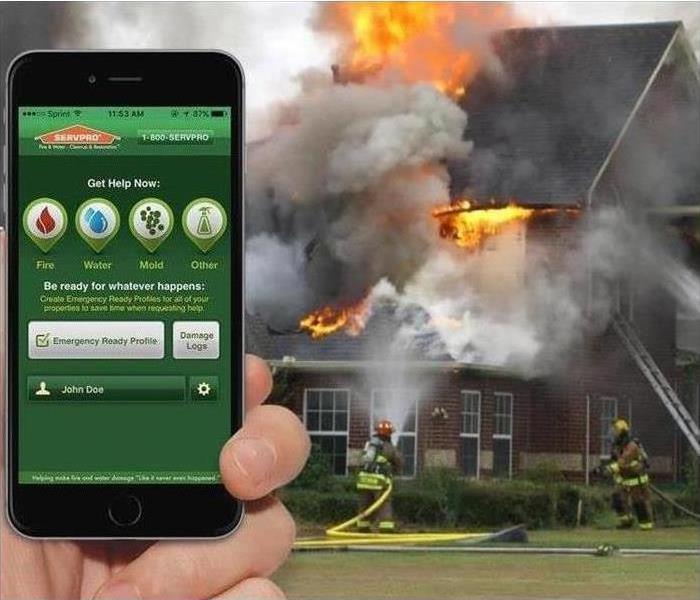 SERVPRO of Northwest Bergen has over 25 years of experience in the fire restoration industry.
SERVPRO of Northwest Bergen has over 25 years of experience in the fire restoration industry.
The fall season brings cooler temperatures, beautiful colors, and an abundance of outdoor activities. October is Fire Prevention Month and an excellent time to examine the fire emergency preparedness plans for your home or business. SERVPRO of Northwest Bergen County is a leading provider for fire cleanup and restoration. We have years of knowledge, and highly trained Service Technicians to properly handle any size fire, smoke or soot disaster. We also have the cleaning products and equipment required to restore your property to preloss conditions.Plan ahead this season to help ensure it is safe and fire-free.
- Fall decorations, like dried flowers and cornstalks, are highly flammable. Keep these and, other decorations away from open flames and heat sources, including light bulbs and heaters.
- Keep emergency exits clear of decorations so nothing blocks escape routes.
- Teach children to stay away from open flames. Be sure they know how to stop, drop, and roll if their clothing catches fire.
- Remember safety first when choosing a Halloween costume. Consider avoiding billowing fabric. If you are making your costume, choose material that won’t easily ignite if it comes into contact with heat or flames.
- It is safest to use a flashlight or battery-operated candle in a jock-o-lantern. Use extreme caution is using a real candle. Place lit pumpkins away from anything that can burn and out of the way of doorsteps, walkways, and yards.
Along with these tips don’t forget to change your batteries in your Fire and Smoke Alarms. Once the alarm goes off you have less then 2 minutes to escape. Create, implement and practice a fire escape plan with your family and/or employees.
SERVPRO of Northwest Bergen County wants you to stay safe, and informed for any type of disaster that comes your way. If your Bergen County area home does suffer damage from a fire, smoke or soot give us a call at: 201-236-2400 we can walk you through the necessary steps to get your home back to normal. Read our Fire clean up tips.
October if Fire Prevention Month: Know What to do Until Help Arrives
10/7/2021 (Permalink)
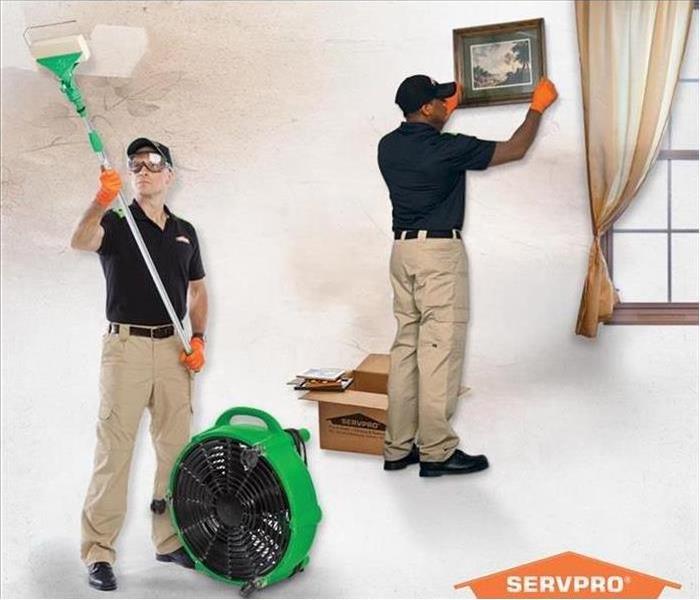 Call SERVPRO of Northwest Bergen to clean and restore your property after a fire.
Call SERVPRO of Northwest Bergen to clean and restore your property after a fire.
First Have an Evacuation Plan and make sure your family or employees are safe.
WHAT TO DO UNTIL HELP ARRIVES TO CLEAN THE DAMAGE
A fire can leave behind soot damage, smoke damage and a host of other problems. Ceilings, walls, woodwork, carpeting, and floors will often need a thorough professional cleaning.
If your home or business suffers a fire, it is important to take the appropriate steps to prevent further damage. The following tips may help reduce damage and increase chances of a successful restoration.
Do:
- Limit movement in the home to prevent soot particles from being embedded into upholstery and carpet.
- Keep hands clean. Soot on hands can further soil upholstery, walls and woodwork.
- Place dry, colorfast towels or old linens on rugs, upholstery and carpet traffic areas.
- If electricity is off, empty freezer/refrigerator completely and prop doors open to help prevent odor.
- Wipe soot from chrome kitchen/bathroom faucets, trim and appliances, then protect these surfaces with a light coating of lubricant.
- If heat is off during the winter, pour RV antifreeze in sinks, toilet bowls, holding tanks and tubs to avoid freezing pipes and fixtures.
- Change HVAC filters; leave system off until a trained professional can check the system.
- Tape double layers of cheesecloth over air registers to stop particles of soot from getting in or out of the HVAC system.
Don't:
- Don't attempt to wash walls, painted surfaces, furniture or carpets. Instead call SERVPRO.
- Do not attempt to clean electrical appliances before consulting authorized repair service.
- Do not consume any food or beverages that may have been stored close to fire, heat or water, as it may be contaminated.
- Do not turn on ceiling fans. Wiring may be wet or damaged and cause electrical shock.
- Don't send garments to the dry cleaner. Improper cleaning may set in smoke odor.
It is important for you to work with professionals trained in fire damage restoration to clean your home or business properly. Our Service Team and Production Managers are IICRC Certified and fully trained to clean fire damaged properties. We also have professional grade equipment and cleaning supplies to successfully clean soot and smoke damage. We make it "Like it never even happened."
Plan for Fire Safety This Fall | SERVPRO® of Northwest Bergen
9/16/2021 (Permalink)
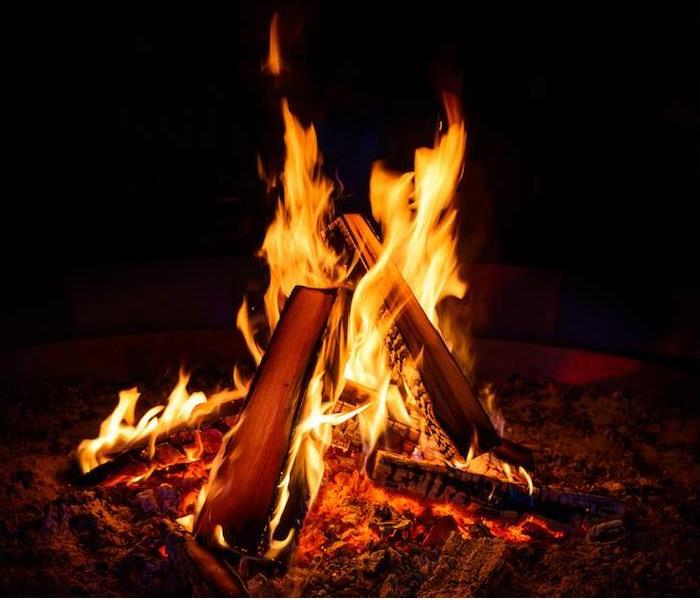 Be mindful about fall fire safety. Always remember that SERVPRO of Northwest Bergen is the trusted leader in the restoration industry.
Be mindful about fall fire safety. Always remember that SERVPRO of Northwest Bergen is the trusted leader in the restoration industry.
You could tell without a calendar that fall has arrived: The temperature is perfectly mild in a way that only happens for a brief period each year, the j-e-t-s are back on the field and there’s a pumpkin flavor of everything available.
Whatever your fall plans are this year, keep in mind a few basic fire safety tips to ensure safe enjoyment of Bergen’s most enjoyable season.
Campfire Safety
Fall is a perfect time for camping, and it can be a great activity this time of year. Just make sure you’re extra careful when building and putting out your campfire.
Your fire needs a 25-foot clearance from any tents or other structures. Ignite your fire only with old-school tools like matches or a lighter— kerosene or lighter fluid may get things going quickly but can get out of control just as quickly.
Make sure an adult is attending to the fire at all times, and be sure to completely put the fire out before you leave. Any warm ash or live embers you leave behind create a wildfire hazard, so make sure everything is cool to the touch and drowned in water.
Space Heaters
For the crisp mornings while you sip your pumpkin-spice coffee at your home office (or really anytime for the cold-natured among us), portable space heaters are a great solution to save energy but still provide some extra warmth. However, they’re one of the most frequent causes of home fire incidents, so take extra care with them.
Use only newer models, which will shut off if they tip over or overheat. Always keep your heater on a flat surface, away from anywhere children might play. Keep it at least three feet from anything—curtains, clothes, couches—that could ignite under intense heat.
Plug your heater directly into a power outlet, as opposed to an extension cord. And finally, make sure you turn it off anytime you leave the room, and certainly when you go to bed; never let it run overnight.
Halloween
When you’re decorating for Halloween, or for fall in general, it’s important to be aware of the presence of candles and their proximity to any decorations, particularly things like cobweb decor or paper items.
And if you’re planning outdoor parties and hanging lights, be sure to plug them in directly to outlets and unplug them when they’re not in use. A short circuit can spark a fire inside your walls, and strands of lights plugged into extensions are just the right recipe to cause one.
If a fire hazard should turn from potential to reality in your home, remember the trusted leader in the fire cleanup and recovery industry and contact SERVPRO to get your property fully restored right down to the smell of smoke.
Fire Safety Tip: Summer Grilling Safety Tips
8/27/2021 (Permalink)
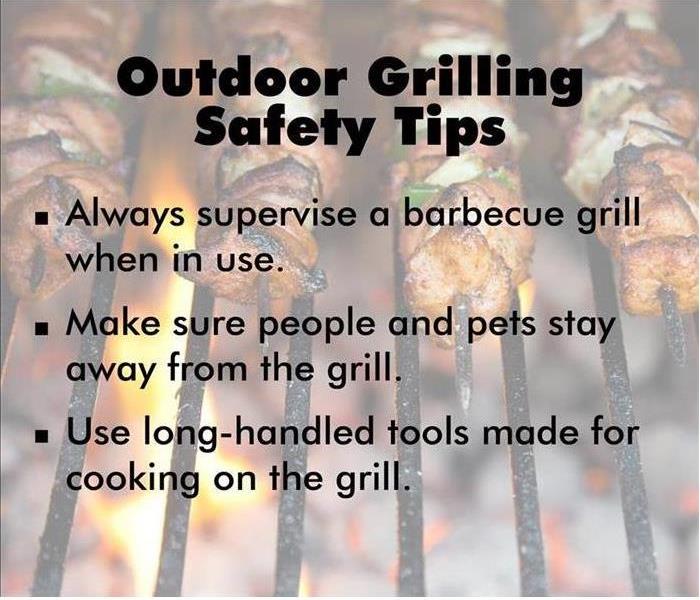 Call SERVPRO of Northwest Bergen for any size fire damage disaster.
Call SERVPRO of Northwest Bergen for any size fire damage disaster.
Every year, approximately 8,900 home fires are started by backyard BBQ grills.
SERVPRO of Northwest Bergen County has responded to many home fire cleanups due to owner complacency or faulty equipment. Don't let this happen to you, pay attention to a few safety rules and your summer BBQs should go off without a problem.
Do:
1. Keep your grill at least 10 feet away from your house. Farther is even better. This includes portions attached to your house like carports, garages and porches. Grills should not be used underneath wooden overhangs either, as the fire could flare up into the structure above. This applies to both charcoal and gas grills.
2. Clean your grill regularly. If you allow grease and fat to build up on your grill, they provide more fuel for a fire. Grease is a major source of flare ups.
3. Check for gas leaks. You can make sure no gas is leaking from your gas grill by making a solution of half liquid dish soap and half water and rubbing it on the hoses and connections. Then, turn the gas on (with the grill lid open.) If the soap forms large bubbles, that's a sign that the hoses have tiny holes or that the connections are not tight enough.
4. Keep decorations away from your grill. Decorations like hanging baskets, pillows and umbrellas look pretty AND provide fuel for a fire. To make matters worse, today's decor is mostly made of artificial fibers that burn fast and hot, making this tip even more important.
5. Keep a spray bottle of water handy. That way, if you have a minor flare-up you can spray it with the water to instantly calm it. The bonus of this tip is that water won't harm your food, so dinner won't be ruined!
6. Keep a fire extinguisher within a couple steps of your grill. And KNOW HOW TO USE IT. If you are unsure how to use the extinguisher, don't waste time fiddling with it before calling 911. Firefighters say many fire deaths occur when people try to fight a fire themselves instead of calling for expert help and letting the fire department do its job.
Don't:
7. Do Not turn on the gas while your grill lid is closed. NEVER do this. It causes gas to build up inside your grill, and when you do light it and open it, a fireball can explode in your face.
8. Never leave a grill unattended. Fires double in size every minute. Plan ahead so that all of your other food prep chores are done and you can focus on grilling.
9. Never Overload your grill with food. This applies especially fatty meats. The basic reason for this tip is that if too much fat drips on the flames at once, it can cause a large flare-up that could light nearby things on fire.
10. Never Use a grill indoors. People often think it will be safe to use a grill, especially a small one, indoors. NOT TRUE. In addition to the fire hazard, grills release carbon monoxide, the deadly colorless, odorless gas. That gas needs to vent in fresh air or it can kill you, your family and pets.
SERVPRO of Northwest Bergen County is a premier fire and water cleanup company that is locally owned and operated. We are Here To Help, with 24/7 emergency service and highly trained IIRC Certified Technicians.
Can Your Family Escape in Two Minutes?
8/17/2021 (Permalink)
Every Second Counts
Fire experts agree, people have as little as two minutes to escape a burning home before it's too late to get out.* In a matter of moments, a small flame can become a major fire, making it critical to be prepared and have an escape plan in place. Once a plan is developed, it is critical everyone in the home understands the plan; the best way to do this is by practicing the escape plan at least twice a year. Increase your chance of surviving a fire by ensuring you have working smoke detectors in place, building an escape plan, and then practicing the escape plan. The following are a few tips to help you develop a plan.
Draw a map of each level of your home and show all doors and windows. Find two ways to get out of each room. Make sure all doors and windows that lead outside open easily.
Consider escape ladders for sleeping areas on the second or third floors. Only purchase collapsible escape ladders evaluated by recognized testing laboratory.
Choose an outside meeting place a safe distance in front of your home where everyone can meet after they've escaped. Mark this place on your escape plan map.
Teach children how to escape on their own in case you can't help them. Plan for everyone in your home with special considerations for elderly or disabled individuals.
Practice your escape plan during the day and nighttime.
*Tips provided by the American Red Cross
Call SERVPRO after you and your family are safe, cleaning up after a fire can be overwhelming. However, prompt cleanup is critical to eliminate secondary damage from water and even mold. Trust the professionals at SERVPRO of Northwest Bergen to help you through the process of cleaning up after a fire damage event at your home or business.
Wildfire Protection Can Start at Home | SERVPRO® of Northwest Bergen
7/23/2021 (Permalink)
 If your home is damaged by fire or any other reason, SERVPRO of Northwest Bergen is ready and able to repair any damage.
If your home is damaged by fire or any other reason, SERVPRO of Northwest Bergen is ready and able to repair any damage.
One of the most unsettling thoughts for homeowners is the idea of seeing one’s home devoured by a raging wildfire. And while it’s true that most home fires in our area are from other root causes, wildfires are not as rare in New Jersey as you imagine.
But you can take action to make your home less likely to fall prey to wildfire, in addition to the oft-ignored practice of simply being careful, which is the top potential method of prevention.
One of those things is known as “defensible space.”
What Is Defensible Space?
It has nothing to do with stopping invaders from Jupiter. “Defensible space” is the practice of creating safe zones around your property that make it difficult for fire to close in on you. You can slow or stop the spread of a fire with the right mix of intentional pruning and tree spacing, gravel and inorganic material around the immediate perimeter of the house, and removal of dry fuel sources like dead trees or brush.
Think of defensible space as a way of choking a fire out before it reaches your home. If there’s nothing to feed the fire, it has to slow down and stop moving.
Defensible space also gives fire crews their best chance of stopping a wildfire before it gets to your house by giving them adequate space in which to work.
Why Defensible Space Matters
While western states are more prone to wildfires because of their drier climates, wildfires can and do occur all over the country. In fact, there were over 59,000 wildfires nationwide in 2020.
Even without the 10,000+ fires in California in the mix, there was still an average of almost 1,000 fires per state in 2020, and no state was totally spared. New Jersey experienced almost 2,000 wildfires and saw almost 12,000 acres of land burn last year. That’s more than 18 square miles!
And 2021 is shaping up for more of the same—there has actually been a 25% increase in the number of fires so far nationwide.
The truth is that anything that can be done to slow or stop wildfires needs to be done, and while defensible space isn’t required by law in New Jersey as it is in some states, you should consider it as a way to protect your home from potential danger.
SERVPRO of Northwest Bergen is a premier fire restoration company located in Bergen County. We have trained Service Technicians on call 24 hours a day, 365 days a year to help you in case of an emergency. Visit Fire Damage Services to learn more.
If your home is damaged by fire of any sort, wild or not, SERVPRO is ready and able to repair the damage caused. Get in touch today to get the pros on your team.
Fire Safety Tips: Do You Have An Escape Plan
7/20/2021 (Permalink)
Fire Safety and Prevention Tips
Fire prevention should be your first concern. The best thing is to make sure everyone in the household knows what to do if there is a fire in the home.
- Install smoke alarms and carbon monoxide detectors in your home and test them monthly.
- Know two ways out of every room in your home.
- Create a home fire escape plan, practice it at least twice a year.
- Identify a meeting place outside your home for your family or anyone who lives in the home.
- Don't Wait, Check the Date-Replace smoke alarms every 10 years.
- Store matches and lighters safely, mainly out of the reach of children. Also, make sure you store them in locations where combustion or exposure to flames is not an issue.
- Practice proper cooking safety. Don't leave cooking food unattended, have a working fire extinguisher in the kitchen, keep children and pets away from the kitchen while cooking.
- Be careful with all open flames, never leave them unattended. This would include your fireplace and candles.
- Generators should always be used outside the home. Carbon monoxide poisoning can occur when a generator is not working or vented properly.
The key is to reduce risks by practicing fire safety in your home, while there are no guarantees taking these steps will help prevent fires and keep your family safe.
SERVPRO of Northwest Bergen is a premier fire restoration company located in Bergen County. After you have the safety plan in place, have our phone number on hand in case your home has a fire damage event. We have trained Service Technicians on call 24 hours a day, 365 days a year to help you in case of an emergency. Visit Fire Damage Services to learn more.
Smoke Alarms in Your Bergen County Home are LIFE SAVERS
5/21/2021 (Permalink)
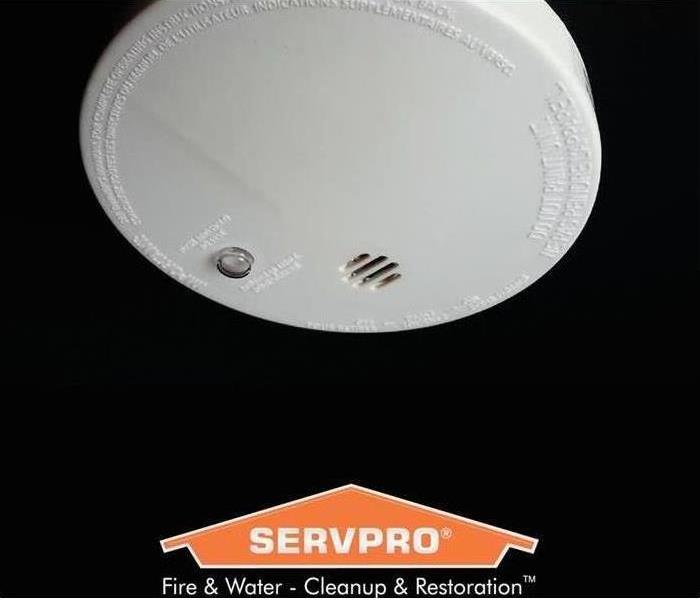 SERVPRO of Bergen County is a IICRC Certified firm and a premier fire restoration specialist.
SERVPRO of Bergen County is a IICRC Certified firm and a premier fire restoration specialist.
Smoke alarms save lives when properly installed and maintained, according to the National Fire Protection Association (NFPA).
In homes, smoke alarms should be in every bedroom and on every level, including the basement. In office and commercial environments, check your state requirements or contact your local Fire Marshall to help ensure all codes are met.
Here are some guidelines to follow for properly using and maintaining a smoke alarm:
- Test smoke alarms monthly using the test button.
- Smoke alarms with non-replaceable batteries need the entire smoke alarms unit replaced every ten years.
- If the alarm chirps signaling low battery, take the proper steps to replace the unit or the batteries immediately.
- Never disable or remove the battery from an alarm. Almost half the fires where smoke alarms were present but did not activate had missing or disconnected batteries (NFPA).
In larger commercial facilities, hard wired or wireless smoke alarms offer benefits such as not needing to be tested as often and activating throughout the entire building if smoke is detected in just one area (NFPA).
If you need help installing, testing, or changing batteries in your smoke alarms, contact your local fire department, an electrician or the American Red Cross.
Be sure your home or workplace has a fire emergency escape plan in place and conduct regular drills to ensure proper execution of the plan. The NFPA website is a good resource for information.
If your home or business has suffered damage from a fire SERVPRO of Northwest Bergen has the experience, training and equipment to clean and restore your property from any size fire damage loss. We have been in business for over 25 years and service the entire Bergen County, New Jersey area. Learn about our services here Fire cleanup and restorations services.
Smoke Alarms are LIFE SAVERS
4/1/2021 (Permalink)
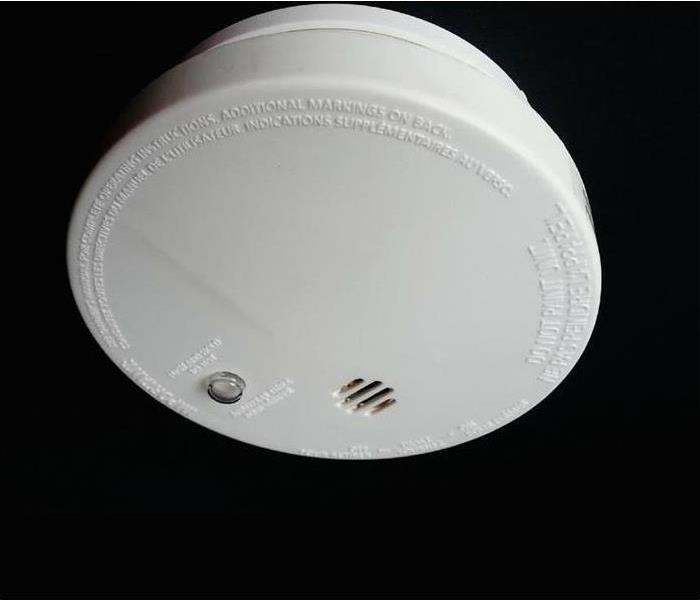 Smoke Detector
Smoke Detector
Did You Know? Smoke alarms save lives when properly installed and maintained, according to the National Fire Protection Assoc. (NFPA). Follow these tips:
- In homes, smoke alarms should be in every bedroom and on every level, including the basement. In office and commercial environments, check your state requirements or contact your local Fire Marshall to help ensure all codes are met.
- Test Smoke alarms monthly using the test button. Smoke alarms with non-replaceable batteries need the entire smoke alarm unit replaced every ten years. Other smoke alarms need batteries replaced every year and the unit replaced every ten years. If the alarm chirps signaling low battery, take the proper steps to replace the unit or batteries immediately. Never disable or remove the battery from an alarm. Almost half of fires where smoke alarms are present but did not activate had missing or disconnected batteries. (source NFPA)
- In larger commercial facilities, hard wired or wireless smoke alarms offer benefits such as not needing to be tested as often and activating throughout the entire building is smoke is detected in just one area. (source NFPA)
If you need help installing, testing or changing batteries in your smoke alarm, contact your local fire department, electrician or the American Red Cross.
SERVPRO of Northwest Bergen has IICRC certified and trained Service Technicians that have the knowledge and experience to clean and restore your Bergen County property after a fire damage event.
(Source: Restoration Newsline Vol.29, Issue 9)
Kitchen Cautions During The Holiday Season
12/22/2020 (Permalink)
Each Holiday Season, families gather to celebrate, which includes cooking large dinners, but if you don't practice safe cooking habits your holiday could become hazardous very quickly. According to the National Fire Protection Association (NFPA), cooking fires are the number one cause of home fires and home injuries. The leading cause of fires is unattended cooking. Here are some useful tips to avoid cooking fires:
- Be on ALERT! If you are sleepy or consumed alcohol don't use the stove.
- Stay in the kitchen while you are frying, grilling, boiling, or broiling food.
- If you are simmering, baking or roasting food, check it regularly, and remain in the kitchen while food is cooking, and use a timer to remind you that you are cooking.
- Keep anything that can catch fire (oven mitts, wooden utensils, food packaging, and towels) away from the stovetop.
If you have a cooking fire, consider the following safety protocols to help keep your family safe.
- Just get out! When you leave, close the door behind you to help contain the fire.
- Call 911 or the local fire department after you leave.
- For an oven fire turn off the heat and keep the door closed.
- If you try to fight the fire, be sure others are getting out and you have a clear way out.
- Keep a lid nearby when you're cooking to smother small grease fire. Smother the fire by sliding the lid over the pan and turn off the stove-top. Leave the pan covered until it is cooled completely.
SERVPRO of Northwest Bergen wants you to keep your Bergen County home safe this holiday season! We have 24/7 emergency service--even during the holidays 201-236-2400.
Light the Holiday Season Safely
12/13/2020 (Permalink)
Pretty lights, candles, and decorations are just a few of the items bringing charm and cheer to the holiday season-however, if they are not used carefully your holidays may go from festive to frightening.
The American Red Cross offers the following safety tips to help greatly reduce the fire risk in your home or business this holiday season.
- Place Christmas trees, candles and other holiday decorations at least three feet away from heat sources like fireplaces, portable heaters, radiators and heat vents.
- Make sure that light strings and other holiday decorations are in good working condition. Do not use anything with frayed electrical cords and always follow the manufacture's instructions.
- Always unplug your tree and holiday lights before leaving the property or going to bed.
- Never use lit candles to decorate a tree. Always extinguish candles before leaving the room or going to bed.
The entire team at SERVPRO of Northwest Bergen County is wishing you and your family a Merry and Safe Holiday Season!
How To Prevent Home Fires
12/8/2020 (Permalink)
Sometimes accidents happen, but when it comes to your Bergen County home or business property, there are certain safety precautions that can be taken to help prevent fires.
Electrical and Appliance Safety
- Frayed wires can cause fires. Replace all worn, old or damaged appliance cords immediately ad do not run cords under rugs of furniture.
- If an appliance has a three-prong plug, use it only in a three-slot outlet. Never try to force it to fit into a two-slot outlet or extension cord.
- Immediately shut-off, then professionally replace, light switches that are hot to the touch and lights that flicker.
- Space Heaters-should never be left running unattended. (see tips in photo)
Fireplace and Woodstoves
- Inspect and clean woodstove pipes and chimneys annually and check monthly for damage or obstructions
- Use a fireplace screen heavy enough to stop rolling logs and big enough to cover the entire opening of the fireplace to catch flying sparks.
- Make sure the fire is completely out before going to bed or leaving the house.
During the cold weather months in Bergen County, New Jersey it is especially important to keep these tips in mind. SERVPRO of Northwest Bergen is a premier fire damage restoration company, that has a fully trained staff, professional equipment and products, and many years of experience in fire restoration and cleanup. Call us at 201-236-2400.
Source: ready.gov
Fire Extinguishers: Tips You Should Know
11/4/2020 (Permalink)
Portable fire extinguishers can be life and property saving tools when used correctly. In order to operate an extinguisher, the National Fire Protection Association (NFPA) suggest remembering the word PASS:
Pull the pin. Hold the nozzle pointing away from you and release the locking mechanism.
Aim low. Point the extinguisher as the base of the fire.
Squeeze the lever slowly and evenly.
Sweep the nozzle from side to side.
Read the instructions on the fire extinguisher and become familiar with them before a fire breaks out. It is also important to ensure you have the correct type of extinguisher for your home or facility. To find more information on choosing the appropriate class extinguisher, please visit the NFPA website at http://www.nfpa.org/codes-and-standards/all-codes-and-standards/list-of-codes-and-standards?mode=code&code=10
SERVPRO of Northwest Bergen is a leader in the fire restoration industry. We have over 25 years of experience, IIRC trained technicians, and professional grade cleaning products and equipment. Don't leave the most imortant job of cleaning your home after a fire to just anyone--Call the professionals at SERVPRO of Northwest Bergen County 201-236-2400.
Celebrate Summer Safely: FIREWORKS
6/30/2020 (Permalink)
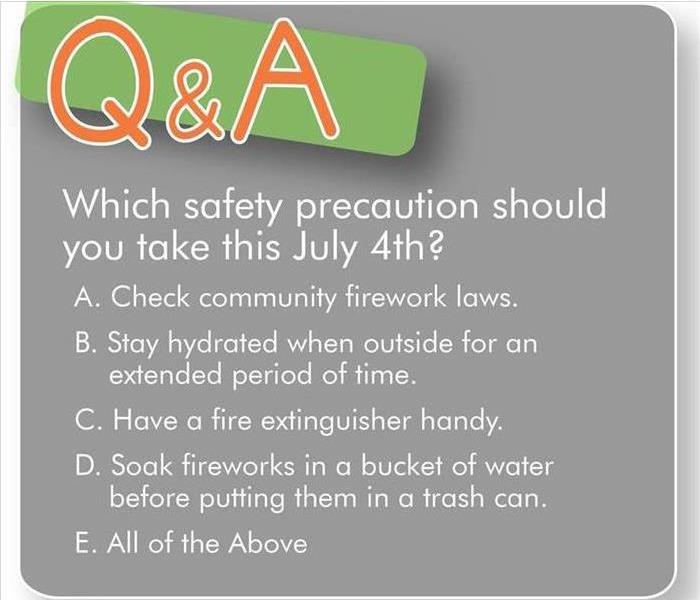 E- all of the above
E- all of the above
Fireworks Safety Tips
Summer is synonymous with barbeques, parades and fireworks displays; but along with all the festivities are plenty of visits to emergency rooms-especially during July.
Each year, around 230 people are injured badly enough to require medical treatment after fireworks-related incidents, according to the U.S. Consumer Product Safety Commission. In addition to causing injury, fireworks are also responsible for thousands of house fires each year with millions of dollars in property damage.
- Anyone using fireworks or standing nearby should wear protective eyewear.
- Do not try to re-light or handle malfunctioning fireworks
- Keep a bucket of water nearby to fully extinguish fireworks that don't go off or in case of fire.
- Children should never pick up fireworks that may be left over as they may still be active.
- The safest way to enjoy fireworks is to attend a public display conducted by trained professional.
- Have a Happy Fourth of July.
Firework Facts:
- Fireworks cause an average of almost 20,000 reported fires per year.
- In 2013, sparklers caused 41% of fireworks injuries.
- On Independence Day in a typical year, fireworks account for two out of five reported fires, more than any other cause of fire.
SERVPRO of Northwest Bergen is locally owned and operated company in Bergen County, New Jersey. We are a premier fire cleanup and restoration company with over 25 years of experience and training. We also have the professional cleaning products and equipment to get your property restored properly and quickly.
AND the answer to the question is E!
Tips and information provided by the National Fire Protection Assoc.
Fire Safety: Early Warnings Saves Lives
6/4/2019 (Permalink)
During a fire, early warnings from a working smoke alarm plus a fire escape plan that is practiced regularly can save lives.
- Do you have a fire escape plan?
- Have you changed your Smoke Alarm batteries within the last year?
- Are you prepared?
The National Fire Protection Association (NFPA) sets aside a designated week each October to focus on Fire Prevention. This years theme is "Every Second Counts: Plan 2 ways out!"
According to the NFPA, once the fire alarm goes off "you have less than two minutes to get out safely," yet only 8% of people surveyed said getting out was the first thought after hearing the alarm. Creating, implementing, and practicing a fire escape plan for your home or business may be the difference between safety and tragedy. Make your plan today. Visit http://www.nfpa.org/fpw
Read More about SERVPRO of Northwest Bergen's Fire Restoration services
Fireplace and Portable Heating Safety Tips
3/22/2019 (Permalink)
Did you know? 50% of all residential heating-related fires are reported during the months of December, January and February.
Keep the following safety tips in mind to help reduce your risk of a heating-related fire.
- Keep anything flammable at least three feet away from heating equipment., like the furnace, fireplace, wood stove, or a portable space heater. Have a three foot "kid free" zone around open fires and space heaters.
- Make sure the fireplace has a sturdy screen to stop sparks from flying into the room. Ashes should be cool before putting them in a metal container a safe distance away from your home.
- Remember to turn portable heaters off when leaving the room or going to bed.
- Always use the right kind of fuel, specified by the manufacturer, for fuel burning space heaters.
- Have heating equipment and chimneys cleaned and inspected every year by a qualified professional.
- Have a qualified professional install stationary space heating equipment, water heaters or central heating equipment according to the local codes and manufacturer's instructions.
- Test smoke alarms monthly.
If your property does suffer fire damage, contact SERVPRO of Northwest Bergen to help make it "Like it never even happened."
Top Three DO's and DON'Ts after a fire disaster
3/7/2019 (Permalink)
These tips will assist you in taking proper action until SERVPRO of Northwest Bergen technicians arrive. Follow these Do's and Don'ts to help reduce the damage and increase the chances of a successful restoration.
DO:
- Limit Movement in the home to prevent soot particles from being embedded into upholstery and carpet.
- Keep hands clean. Soot on hands can further soil upholstery, walls and woodwork.
- Place dry, colorfast towels or old linens on rugs, upholstery and carpet traffic areas.
DON'T:
- Do not attempt to wash any walls or painted surfaces without first contacting SERVPRO.
- Do not attempt to clean electrical appliances that may have been close to fire, heat or water without first consulting an authorized repair service.
- Do not turn on ceiling fixtures if ceiling is wet, wiring may be wet or damaged and cause electrical shock, and air movement may create secondary damage.
After any fire damage situation, your primary focus should be safety first:
- Is it safe to stay in the house?
- Electrical and "slip and fall" hazards are some of the most prevalent concerns.
- Only do activities that are safe for you to perform.
- Wet materials can be VERY heavy. Be careful!
Carbon Monoxide: A silent cold weather killer
2/12/2019 (Permalink)
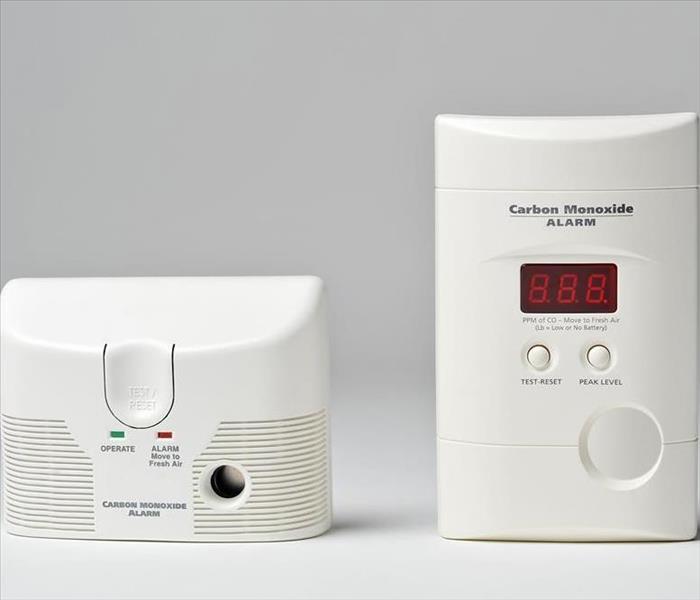 CO Alarm
CO Alarm
Carbon Monoxide is a gas you cannot see, taste, or smell. According to ready.gov, an average of 430 Americans die each year from unintentional carbon monoxide (CO) poisoning. Often times, it is the result of faulty, improperly used, or vented consumer products like furnaces, ranges, water heaters, room heaters and engine-powered equipment such as portable generators. There are precautions you can take to help protect yourself, your family and your employees from deadly CO fumes. Reduce CO fumes exposure in your home or workplace by performing regular maintenance on equipment and appliances that can produce CO. Install carbon monoxide detectors on every level of the home, including outside bedrooms. Consider having all fuel-burning heating equipment and chimneys serviced annually by a professional. Use portable generators only in well ventilated areas away from openings to prevent fumes from entering the home/building. Visit usfa.fema.gov for more info on CO safety.
Smoke Alarms: Life Savers
2/7/2019 (Permalink)
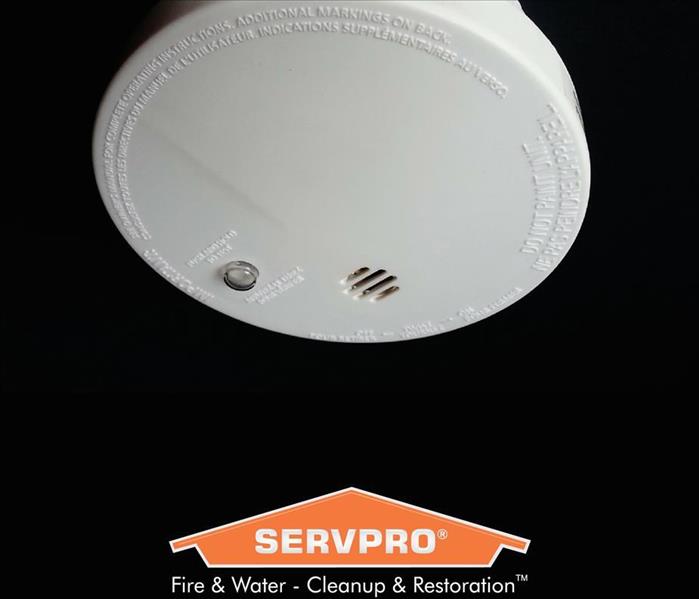 Fire Alarms
Fire Alarms
Smoke alarms save lives when properly installed and maintained, according to the National Fire Protection Association (NFPA).
In homes, smoke alarms should be in every bedroom and on every level, including the basement. In office and commercial environments, check your state requirements or contact your local Fire Marshall to help ensure all codes are met.
Test smoke alarms monthly using the test button. Smoke alarms with non-replaceable batteries need the entire smoke alarms unit replaced every ten years. If the alarm chirps signaling low battery, take the proper steps to replace the unit or the batteries immediately. Never disable or remove the battery from an alarm. Almost half the fires where smoke alarms were present but did not activate had missing or disconnected batteries (NFPA).
In larger commercial facilities, hard wired or wireless smoke alarms offer benefits such as not needing to be tested as often and activating throughout the entire building if smoke is detected in just one area (NFPA).
If you need help installing, testing, or changing batteries in your smoke alarms, contact your local fire department, an electrician or the American Red Cross.
Be sure your home or workplace has a fire emergency escape plan in place and conduct regular drills to ensure proper execution of the plan. The NFPA website is a good resource for information.
If your home or business has suffered damage from a fire SERVPRO of Northwest Bergen has the experience and equipment to clean and restore your property. Learn about our services here Fire cleanup and restorations services.
Home Fires Occur More Often in Winter Months
1/11/2019 (Permalink)
Did you know?
Home fires occur more often during the winter than in any other season.
A home or business fire can be a very stressful event. Damage to personal belongings and the contents of the building is just one concern. Timely mitigation is key to controlling damage, while reducing downtime and recovery costs.
Be Prepared!
- Install Smoke Alarms- on every level of your home
- Test Smoke Alarms at least once a month
- Replace batteries at least once a year
- Replace all smoke alarms every 10 years
Every Second Counts-October is Fire Prevention Month
9/26/2017 (Permalink)
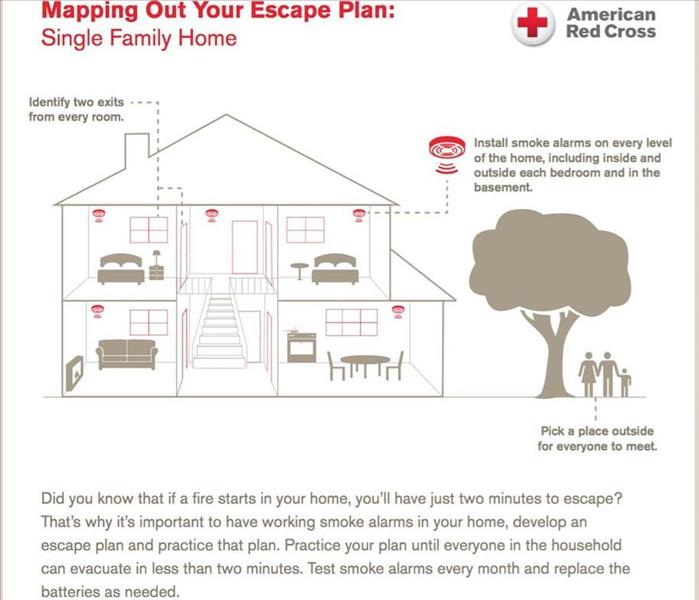 American Red Cross Fire Escape Plan
American Red Cross Fire Escape Plan
Every Second counts during a fire.
Fire experts agree; people have as little as two minutes to escape a burning home. That is why every second counts, it is critical to be prepared and have an escape plan in place. Once a plan is developed, it is important that everyone in the home understands the plan. The best way to do this is to practice the escape plan at least twice a year.
A survey by the American Red Cross shows only 26% of families have a fire escape plan in place.
Here are a few suggestions to help you develop an emergency escape plan.
- Consider escape ladders for sleeping areas on the second and third floors. Only purchase collapsible escape ladders evaluated by a recognized testing laboratory. (Store them by the window)
- Choose an outside meeting place a safe distance in front of your home where everyone can meet after they've escaped, emergency personnel will also be able to see you. Make sure to mark this on your plan.
- Teach children how to escape on their own in case you cannot help them.
- Practice your plan twice a year during the day and at night.
Increase your chance of surviving a fire by having working smoke/fire detectors in place, developing an escape plan, and then practicing the plan with the family.
At SERVPRO our priority is your safety. We are here to help you to prepare for possible disasters, and restore your home after a disaster strikes.
Did You Know? December is the peak time of Year for Home Candle Fires.
12/1/2015 (Permalink)
Candles, pretty lights and decorations are just a few of the items that add to the charm and cheer of the holiday season, however, if not used carefully your holidays may go from festive to frightening.
SERVPRO handles Fire, Smoke and Soot cleanup and restoration. The first steps taken in a disaster situation can mean the difference between recovery and total loss.
SERVPRO professionals help meet the real needs of insurers and property owners by supplying reliable and consistent service.
 Call SERVPRO of Northwest Bergen to clean up after fire damage, we have years of experience with fire, soot, and smoke damage.
Call SERVPRO of Northwest Bergen to clean up after fire damage, we have years of experience with fire, soot, and smoke damage.




 24/7 Emergency Service
24/7 Emergency Service













